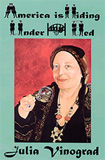 Review by Mary Meriam
Review by Mary Meriam
Zeitgeist Press
1630 University Avenue #34
Berkeley, CA 94703
ISBN 0-929730-84-x
2008, 70 pp., $8.95
www.zeitgeist-press.com
The cover of Julia Vinograd’s new book of poems, America Is Hiding Under My Bed, is graced by a lively, loving portrait of Julia, painted by her sister, Debbie Vinograd. Both Vinograds are portrait artists: Julia paints with words; Debbie is a poet with paint.
Adrienne Rich could have been describing the Vinograd sisters when she wrote, “The revolutionary poet loves people, rivers, other creatures, stones, trees inseparably from art, is not ashamed of any of these loves, and for them conjures a language that is public, intimate, inviting, terrifying, and beloved.”
The book’s eponymous poem is a public, intimate, inviting, terrifying, and beloved portrait of America as a felon, fugitive, and addict. In contrast to a poem about hiding is this poem about being invisible in plain sight:
ON THE STREET
I’m not here, don’t look at me.
Don’t scream when your children look at me,
do you think bad dreams are contagious?
Do you think I’ll breathe bad luck on your children?
Suppose you’d spent the afternoon
shining in your lover’s bed
and then brought him home to meet your parents
and they screamed
“Don’t touch that, you don’t know where it’s been!”
You can’t see me,
I’m just a crack in your contact lens;
I’m just a crack in your mirror.
My hands are dirty.
I’ve got your shadow under my fingernails,
I can’t wash it out.
I’ve got the shakes,
my own skin isn’t speaking to me
and I’m not speaking to you.
I’m not here, I have no past,
no memories, no name, not allowed.
So I eat your memories like garbage,
all your buried broken promises
and the bad dreams you forget
till you see me. Till you don’t see me.
I’m not here.
What is it about the street that makes people “not here”? Bad dreams, bad luck, dirty, shadow, shakes, garbage, buried, broken, “no memories, no name, not allowed.” We need to be seen. Likewise, we need to be heard. Julia’s poems remind us, with gentle force and sensitive passion, that an important human need is to be seen, heard, and remembered. We all need a name that we call our own, and we need other people to remember and say our name. This gives us a feeling of expansion, like breathing, and a feeling of belonging.
“Young Student” is one of Julia’s many Berkeley street portraits, so alive that it seems to be written on the spot. In this poem, the young student is tenderly and forgivingly portrayed. The contrast between the student’s innocence and the hard facts of war are deliciously rendered:
War. Nations. Government. It’s too silly.
She stepped in history like a cat
stepping in wet paint
and getting little red paw prints over everything.
Julia’s poems frequently transform abstract concepts into animistic life. In “Happy Endings,” her witty voice is especially vibrant in these lines:
Happy endings were a door slammed against my nose
and I could hear it locking on the other side.
How rude.
Julia’s poems show again and again that no matter how many times the door is slammed in our face, we must stand up again and keep trying. And one of the best ways to try again is to speak, no matter how ugly we feel our words might be. There is great strength in “Witch”:
I want to be a witch like Mother
and have words leap out of my throat
like warty toads.
Tragedy silences us. We feel crushed, numbed, and dumbed by the terrible things done to us in life. But Julia’s poems inspire us to “spit out the pits,” the hard, indigestible troubles, swallow the cherries, and let the cherry blossoms of compassion bloom in our throats, as they do in “A Bag of Cherries”:
I spit out the pits and feel cherry blossoms
opening in my throat as I swallow.
Cherry blossoms pink over soldiers’ graves.
Here’s a poem by Robert Herrick (1591-1674), dedicated to Julia and her new book:
Cherry Ripe
Cherry-ripe, ripe, ripe, I cry,
Full and fair ones; come, and buy:
If so be you ask me where
They do grow? I answer, there
Where my Julia’s lips do smile;–
There’s the land, or cherry-isle;
Whose plantations fully show
All the year where cherries grow.
You can find Julia Vinograd on Telegraph or at Fourth Street, hawking her book for $5. You’ll know it’s her by the portrait on the cover.
Comments are closed.